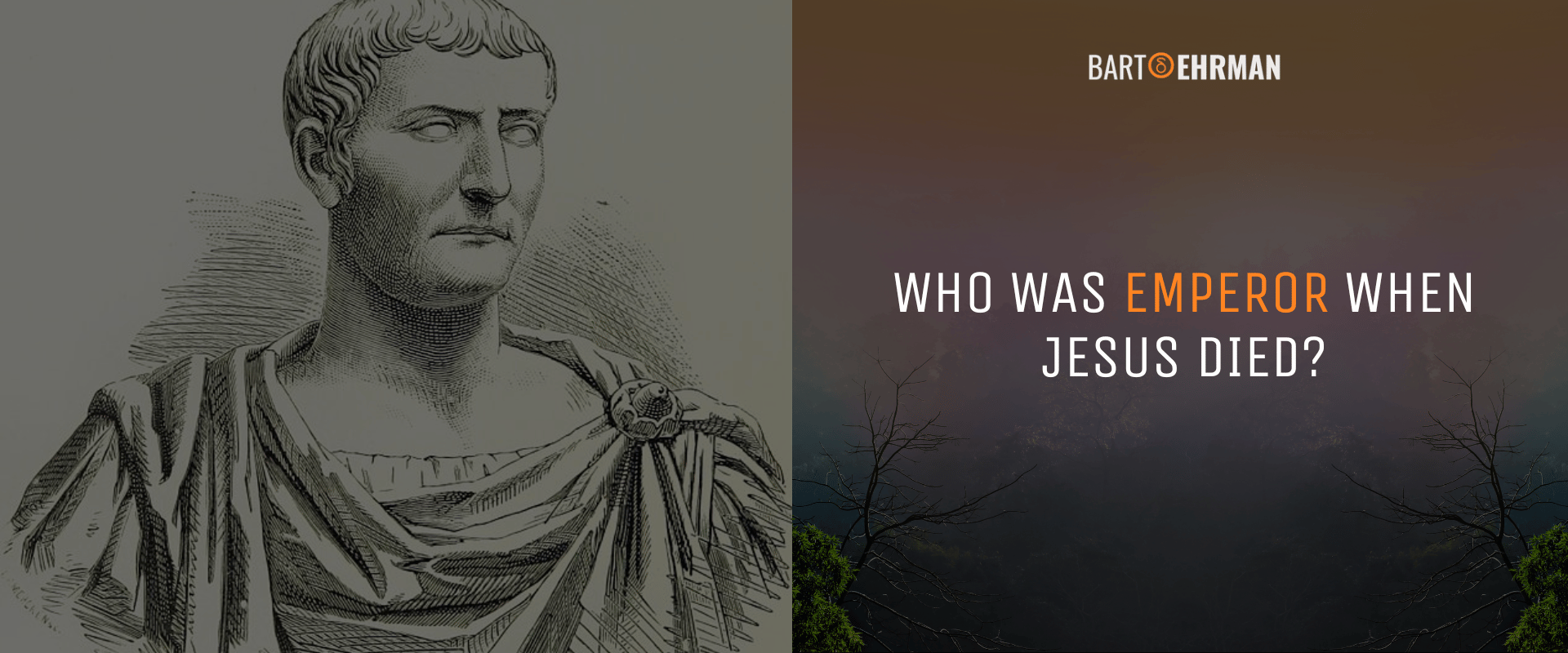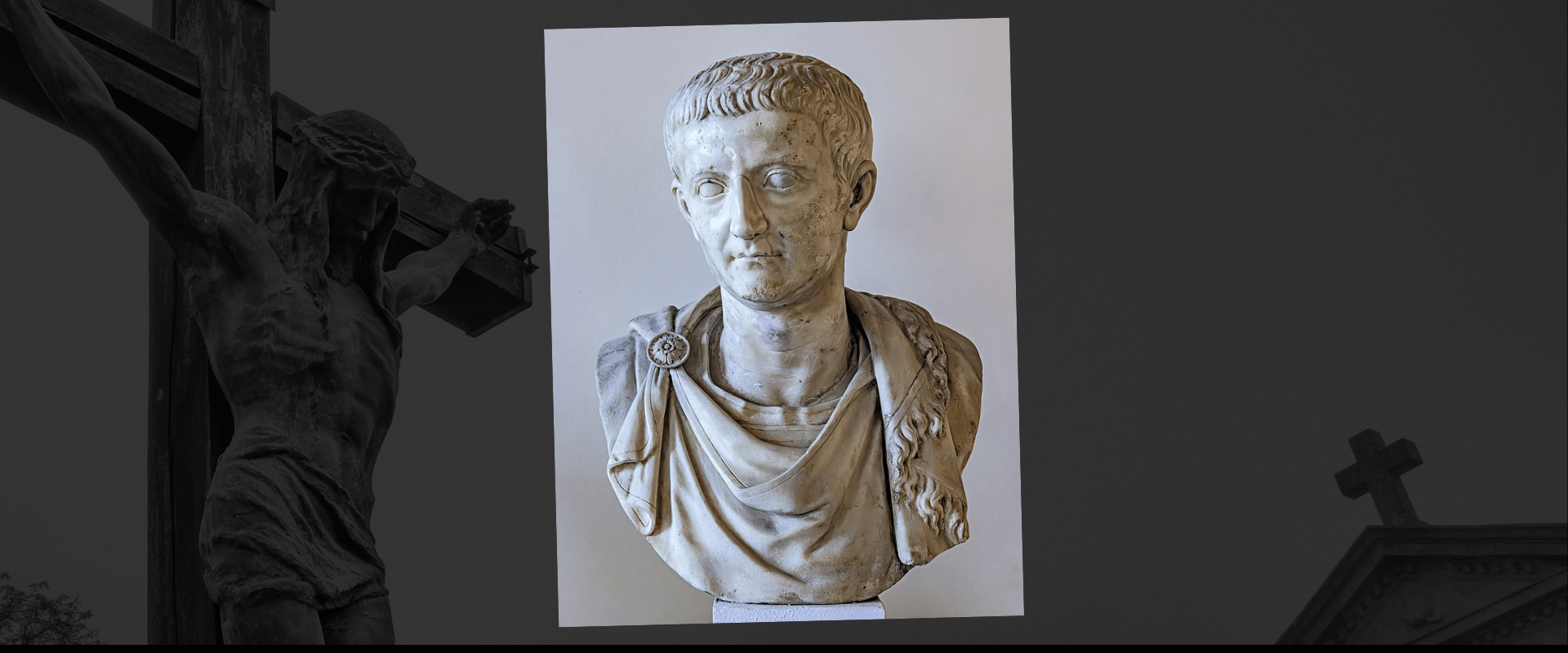Who Was Emperor When Jesus Died?

Written by Marko Marina, Ph.D.
Author | Historian
Author | Historian | BE Contributor
Verified! See our guidelines
Verified! See our editorial guidelines
Date written: October 19th, 2024
Edited by Laura Robinson, Ph.D.
Disclaimer: The views and opinions expressed in this article belong to the author and do not necessarily match my own. - Dr. Bart D. Ehrman
In what is a remarkable insight into the major tenets of Christianity, Joseph Ratzinger emphasized that understanding the Christian religion is only possible with a deep awareness of its historical development. Christianity is profoundly embedded in history, unlike many ancient religions, especially the polytheistic ones that often stood detached from historical events.
(Affiliate Disclaimer: We may earn commissions on products you purchase through this page at no additional cost to you. Thank you for supporting our site!)
At the heart of this religion stands the figure of Jesus, a man who lived, preached, and ultimately was crucified within the specific political and cultural framework of his time. The historical setting is more than just a backdrop — it’s a key part of the narrative.
During the time of Jesus, the Roman Empire was rising in political power, and it wasn’t some abstract force shaping distant events; it was an empire that ruled over vast regions, including Judea, where Jesus lived and died. But when we talk about the figure of Jesus and his crucifixion, one key question arises: Who was the Emperor when Jesus died?
This isn't just a trivial fact! Knowing who wielded imperial power helps us better understand the political atmosphere in which early Christianity was born and grew.
As we explore the rise of the Roman Empire and the man who ruled during the crucifixion, we'll see how the emperor’s reign intersects with the story of Jesus. Far from being irrelevant, this historical context adds layers of complexity to the events that shaped the Christian tradition.
So, let's take a journey back to the ancient world of politics and intrigues to uncover who the emperor of Rome was when Jesus was crucified!

Who Was Emperor of Rome When Jesus Died? Historical Background
The immediate historical context of Jesus' life was the vast and powerful Roman Empire, which stretched from Spain in the west to Syria in the east, encompassing parts of North Africa and Egypt.
This colossal territory was governed under a political structure that had evolved dramatically over time. Rome, which began as a city-state, transitioned into a monarchy in its early days.
However, around 510 B.C.E., the monarchy collapsed, giving rise to the Roman Republic, governed by an aristocratic oligarchy known as the Senate. The Republic, though long-lasting, was not without its troubles. The 2nd and 1st centuries B.C.E. were marked by political upheaval, social tensions, and economic hardships that would eventually lead to its decline.
As Bart D. Ehrman explains in his book The New Testament: A Historical Introduction:
The late republic period saw an increasing number of internal struggles for power... When Julius Caesar tried to become a dictator, he was assassinated in 44 B.C.E. The republic wasn't finally transformed into an empire until Caesar's great-nephew and adopted son Octavian, a wealthy aristocrat and Rome's most successful political leader, brought a bloody end to the civil wars that had racked the city. Octavian assumed full control in the year 27 B.C.E.
Octavian’s rise to power marked the official end of the Republic and the beginning of the Roman Empire. He became known as Augustus, the first Roman emperor. This man consolidated power to drastically reduce the Senate’s influence, relegating it to little more than an advisory body. The real authority now rested with the emperor.
Under Augustus, the Roman Empire was administratively efficient, managing its enormous territory by appointing provincial governors — such as Pontius Pilate in Judea — to enforce Roman rule. In some regions, Rome installed client-kings, such as Herod the Great. They acted as puppet rulers, fully reliant on the empire’s authority.
The Romans typically ruled from a distance, focusing on maintaining order and collecting taxes, leaving the day-to-day governance to these local authorities. This created a blend of direct and indirect rule that allowed the empire to maintain control over such a vast region with a relatively small military presence.
In this political environment, with Rome as the central authority, Jesus lived and preached in the province of Galilee. His crucifixion, a form of Roman capital punishment, was carried out under Roman authority in Judea, making the question of who held imperial power at the time a significant one.
So, who was the emperor when Jesus died? To answer that, we must now turn our attention to Emperor Tiberius — a man who successfully came to power after Augustus.
Tiberius Julius Caesar Augustus: An Introduction to His Reign
When Augustus passed away in 14 C.E., his adopted son Tiberius was already in a position of significant authority, having been groomed as the next ruler. Still, Tiberius' rise to power wasn’t without its hiccups.
As the Roman historian and senator Tacitus notes, “The first crime of the new regime was the slaughter of Agrippa Postumus” — a reference to Augustus' grandson, who had been exiled and was seen as a potential threat.
The decision to eliminate Agrippa had actually been made before Augustus' death, as Robin Seager observes in his Biography of Tiberius: “The decision to liquidate Agrippa had been taken by Augustus cannot be doubted... The final version of the will had been drawn up on 3 April, 13. It follows that Augustus had by then already made up his mind that Agrippa could not be allowed to survive him.”
After Augustus' death, Tiberius, showing perhaps a theatrical reluctance, brought his predecessor’s body back to Rome and, by early December of 14 C.E., was officially confirmed as the sole ruler by the Senate.
While his hesitation might have been interpreted as modesty, I think it was little more than political stagecraft — a show for the Senate. After all, in Roman politics, appearances often mattered as much as deeds, and playing the part of the reluctant ruler only solidified Tiberius' legitimacy.
Tiberius' early reign, however, was soon marred by significant trouble. Reports arrived from the north that Roman armies in both Germany and Pannonia had revolted. Tiberius immediately dispatched his son, Drusus, to quell the Pannonian revolt, which he did.
Meanwhile, in Germany, hopes were raised among some soldiers that Germanicus — the charismatic son of Tiberius' brother Drusus — might claim the throne himself. Yet Germanicus, ever loyal, suppressed the mutiny in Germany and later spent the years 15 and 16 C.E. campaigning across the Rhine, further building his reputation as a military hero.
Did You Know?
Tiberius' Island of Debauchery: Capri's Dark Secrets
Tiberius, the emperor during Jesus’ crucifixion, wasn’t exactly known for his sunny personality — and his later years were marked by some truly scandalous behavior. After retreating to the island of Capri in 26/27 C.E., Tiberius left the day-to-day running of the empire to his right-hand man, Sejanus, while indulging in some rather questionable activities.
According to the Roman historian Suetonius, Tiberius turned Capri into his playground, engaging in wild debauchery and earning a reputation for sexual exploits.
One particularly infamous rumor was that he kept young boys and girls, whom he referred to as his “minnows,” to swim between his legs during his baths. Let’s just say, the emperor’s private life wasn’t exactly the picture of Roman virtue! Or perhaps it was?
Germanicus’ popularity, however, came with its dangers. While he was much beloved by the army and the Roman people, his sudden illness and death in 19 C.E. during a journey through Egypt raised more than a few eyebrows.
As anyone familiar with Roman history knows, “mysterious deaths” were practically part of the political landscape. The Roman populace, outraged, rallied behind Germanicus’ widow, Agrippina, and her children, viewing them as the rightful heirs of Augustus' legacy.
With Germanicus out of the picture, Tiberius’ son Drusus (often called Drusus the Younger) seemed poised to inherit the empire. In 21 C.E., Drusus was named co-consul alongside his father and granted tribunician power (a title that granted political and legal authority similar to that of a tribune).
Dynastic stability appeared secure, especially with Drusus’ marriage to Germanicus’ sister, Julia Livilla. But Rome’s politics are never that simple. Enter Lucius Aelius Sejanus, the Praetorian prefect who rapidly ascended the ranks, positioning himself as a major player in the imperial court.
As Sandra Bingham notes in her book The Praetorian Guard: A History of Rome’s Elite Special Forces: “Sejanus played a pivotal role in the running of the empire, though it always must be remembered that the position of Praetorian prefect was relatively new, and he was responding to the situation as it unfolded rather than taking advantage of authority already in place.”
Sejanus, ever the political opportunist, managed to manipulate Tiberius' deepening paranoia. By 27 C.E., Tiberius had retreated to the island of Capri, leaving the affairs of Rome largely in Sejanus' hands. Sejanus methodically eliminated Germanicus’ sons and Agrippina herself, positioning himself as Tiberius' most trusted advisor.
His rise seemed unstoppable — until it wasn’t.
In a stunning twist of fate, Tiberius finally grew suspicious of his once-trusted prefect. On October 18, 31 C.E., Sejanus was dramatically arrested and executed after a letter from Tiberius, read aloud in the Senate, withdrew imperial support. Politics in Rome, as ever, was a dangerous game where fortunes could change in the blink of an eye.
If we are to believe Suetonius, the final years of Tiberius’ reign were largely uneventful as he remained secluded on Capri. His death on March 16, 37 C.E., marked the end of a reign defined by political intrigue, military success, and personal isolation.
During all this, far away in the province of Judea, a relatively unknown preacher named Jesus was executed by Roman authorities. So, who was the Roman emperor when Jesus died?
Tiberius Caesar — a ruler whose own life was filled with conspiracies and power struggles — held the throne during this critical moment in history. But did he even know of Jesus’ existence? That, and more, we’ll explore in the next section.
FREE COURSE!
WHY I AM NOT A CHRISTIAN
Raw, honest, and enlightening. Bart's story of why he deconverted from the Christian faith.
Over 6,000 enrolled!
Tiberius and the Bible: Did the Roman Emperor Know Jesus?
Does the New Testament ever mention Tiberius? Well, not directly. While Pontius Pilate, the governor of Judea who sentenced Jesus to death, plays an important role in the Gospel accounts, the emperor himself remains absent from the biblical narrative.
This isn’t particularly surprising, though — Emperor Tiberius was ruling from Rome, far removed from the local affairs of a small, distant province like Judea.
Today, mythicists (those who claim Jesus never existed) often point to the supposed lack of pagan sources mentioning Jesus in the 1st and 2nd centuries as evidence for their case.
Timothy Freke and Peter Gandy, for example, argue that it’s strange we don’t find Jesus' trial or crucifixion mentioned in Roman records. They emphasize how Romans were renowned for their detailed record-keeping, especially regarding legal matters.
However, as Bart D. Ehrman points out in Did Jesus Exist? this is a flawed argument:
If Romans were careful ‘record keepers’, it is passing strange that we have no records, not only of Jesus but of nearly anyone who lived in the first century. We simply don’t have birth notices, trial records, death certificates — or other standard kinds of records that one has today. Freke and Gandy, of course, do not cite a single example of anyone else’s death warrant from the first century.
In reality, it’s not all that shocking that official Roman records don’t mention Jesus. The Roman Empire spanned a vast area, covering millions of square miles and populated by roughly 60 million people. It’s highly unlikely that Emperor Tiberius — ruling from distant Rome — would have heard about a relatively unknown preacher executed in a small province.
To put it humorously, I often ask my students if they know the name of the mayor of my small hometown, just 40 miles away from the capital.
Despite all the wonders of modern communication — mobile phones, the internet, social media — most of them have no idea! So, how likely is it that Tiberius, living in the 30s C.E., would have heard about Jesus? The answer is simple: he probably didn’t.
For historians, this lack of mention is hardly surprising. The Roman Empire didn’t have CNN, Twitter, or even telegraphs to spread news quickly. Jesus, during his lifetime, was a relatively obscure figure, and for Tiberius, the emperor when Jesus died, one small affair in Judea wasn’t that important.

Conclusion
The crucifixion of Jesus took place during the reign of Tiberius, a complex and controversial ruler whose reign deeply influenced the political landscape of the Roman Empire. While he is not mentioned directly in the New Testament, his governance set the stage for key figures like Pontius Pilate, who was responsible for Jesus’ trial and execution.
Given the vastness of the Roman Empire and the limited communication methods of the time, it’s highly unlikely Tiberius would have known about the execution of a relatively obscure figure in distant Judea.
So, in conclusion, who was the emperor when Jesus died? It was Tiberius Julius Caesar Augustus (born c. 42 B.C.E., and died in 37 C.E.) — A man far removed from the events in Judea, consumed by the political intrigues and power struggles that defined his later years.
While his name remains absent from the biblical narrative, his reign provides the historical backdrop against which the early Christian movement began to take shape.
For a deeper exploration into the origins of Christianity, check out Dr. Bart D. Ehrman’s online course, “The Genius of Mark: Jesus the Secret Messiah”, where he provides a fresh scholarly perspective on the earliest Gospel and the complex history of Christianity's beginnings!
FREE COURSE!
WHY I AM NOT A CHRISTIAN
Raw, honest, and enlightening. Bart's story of why he deconverted from the Christian faith.
Over 6,000 enrolled!
